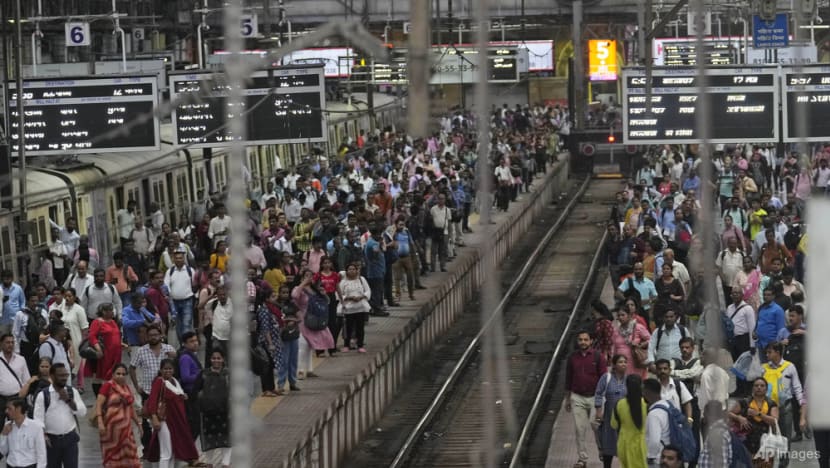India reaping benefits as investors divert billions of dollars away from China amid slowing economy
Potential risks still remain, however, including the outcome of India’s general election this year and the broader geopolitical landscape.


This audio is generated by an AI tool.
MUMBAI: India's stock market is reaping the benefits as investors divert billions of dollars away from China, amid its slowing economy, towards the South Asian giant.
The trend of China's economic slowdown is likely to persist in the coming years, as the country struggles with sagging productivity and a rapidly ageing population, the International Monetary Fund (IMF) said earlier this month.
Meanwhile, India's economic growth, large population, and policy reforms are all factors that are driving cash into its equity markets, according to market analysts.
Potential risks still remain, however, including the outcome of India’s general election this year and the broader geopolitical landscape.
Analysts are widely expecting India's benchmark Sensex and Nifty indices, which include the country's largest and most actively traded stocks, to continue rising this year with a double-digit percentage increase.
Sectors across the board are poised to perform well, including those seen as having been overvalued, such as public sector banks and power companies, said analysts.
These could benefit from the government’s budget for the next financial year presented at the start of February, which would increase spending in areas such as infrastructure.
FALLING INVESTOR INTEREST IN CHINA
Foreign and domestic investors have been pumping money into Indian equities, helped by cooling investor interest in China amid its economic woes, Samco Securities' head of research Apurva Sheth told CNA.
His team at the brokerage has observed India's stock market go from strength-to-strength over the past year.
Last year, India's stock market attracted US$20 billion in foreign inflows, according to official data.
“Clearly, you see that investors want returns and if they are not getting those returns in the Chinese economy, the capital will flow to some other place where they are getting good returns,” said Mr Sheth.
“So I think that's what we are seeing globally, that people are moving out of China and moving to other countries where they see good growth opportunities.”
Over the past year, the Shanghai Composite Exchange has fallen some 13 per cent, while India's benchmark BSE Sensex index rose about 17 per cent in the same period.
India's stock market briefly last month even overtook Hong Kong's, where many major Chinese companies are listed, to become the fourth-largest in the world.
“Typically, if you look at the requirements for a global investor, they are looking at investing in fast growing companies and in thriving economies, and also a political environment which is largely stable,” said Mr Sachin Mehta, director of investment banking at Anand Rathi Advisors.
“Today, if you look at where India stands, it sort of trumps almost every other major economy in all of these factors.”
India is currently the world’s fastest growing major economy, with the World Bank pegging its economic growth at 6.3 per cent in the current financial year running until the end of March.

It is also the most populous country globally, and is projected to continue growing to potentially 1.668 billion people in 2050.
PRIME INVESTMENT DESTINATION
Wall Street giants, including Morgan Stanley and Goldman Sachs, have identified India as a prime investment destination.
Earlier this month, Morgan Stanley Capital International, or MSCI, raised India's weightage in its Global Standard index, which tracks emerging markets stocks, to a record high of 18.2 per cent.
In contrast, China's weight on the index was reduced from 26.6 per cent to 25.4 per cent a year back.
While investors are eager not to miss out on India's growth story, there remains some concerns about an overvaluation of equities, stockbrokers told CNA.
Observers will also be keeping a close eye on India’s upcoming general election due by May this year, in which incumbent Prime Minister Narendra Modi is widely expected to be elected for an unprecedented third term.
His ruling Bharatiya Janata Party (BJP) had clinched three of the five state elections in December last year, outperforming what election pundits and exit polls had suggested.
A Modi and BJP win could help with policy continuity and reassuring investors, said experts.
“Maybe they might take some time because of the election, which is going to be a main driver in deciding whether you should come or not come,” Mr Gaurang Shah, senior vice president of Geojit Financial Services, told CNA.
“But once we have the government, I think you will have a lot of foreign investors or fund managers who have not yet participated in the Indian growth story coming in and participating, and the old ones who are there will bring in more dollars and invest in India.”
Mr Shah said geopolitical risks are also a matter of concern, but noted that India has so far been comparatively resilient to external shocks.














